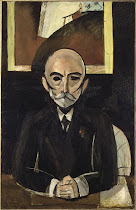The story is roughly based on Valentino Achak Deng's life and provides Western readers a way to learn about Sudan without reading Wikipedia. I find it hilarious (in a sad way) that both Eggers and Deng are clearly used to explaining that the book is not about 'Darfur'. My great great grand, Darfur is a region in Sudan where the media lets us know that there is authentic African "ethnic conflict" and "genocide". It is a catchphrase amoung wealthy white people who seek to create meaning in their own lives by toying with the idea of being the saviour of a distant, exotic 'other'. At one point in their life every wealthy white person imagines traveling to a far off land to save the Wretched of the Earth. This is an echo from the age of imperialism when Europeans cast themselves in a morality play as the rescuers of inferior Africans.
There's nothing wrong with caring about strangers but do we have to play make believe? Let's take a look at how What is the What was created.
The book is based on interviews with Deng combined with Eggers' research about the Lost Boys. It's a tough sell since it's a fictionlized memoir. Eggers constructs a character but keeps Deng's real name. What? Why not simply write a truthful biography? Well, in the introduction, Deng claims they turned to fiction because he couldn't faithfully reconstruct his childhood conversations. Smoke and mirrors. Don't trust Deng, he'll say anything to get you to donate to his fund and raise awareness about the plight of his loved ones in Sudan.
And rightfully so. There's something f*cked up going on here. The fact is, Deng's real story wasn't tragic enough. There's a real undercurrent in this novel that Eggers and Deng are selling tragedy. The more horrendous the better. The story is about Deng's difficult life. He experienced terrible things as an adult and as a child. But what's more tragic than him having to watch a childhood friend being eaten by a lion? What if it happens two or three times? The book becomes a sensational highlight reel.
"Sometimes I’d [Eggers] read a human rights report about a certain incident during the civil war, and would ask Val if he knew someone who had experienced that incident, or something like it. Sometimes he did know someone, and we could go from there, but other times I had to imagine it on my own. Some of these scenes were necessary to include, even if Val didn’t have personal experience with them." (see interview)I think there's a more interesting story about how someone who survives an experience that is clearly traumatic and tragic would have to dress it up to sell it. I'm surprised Eggers wasn't tuned to that frequency. The book sacrifices sincerity for sensationalism. In the end, it encourages us to play imperialist make believe by encouraging us to gawk at tragedy.
*I was moved by the scene with Noriaki Takada's family.





No comments:
Post a Comment